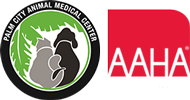Did you know that feeding your 44-pound dog a dried pig’s ear or a hotdog is the same as you eating three donuts? Or that eating two donuts is the human equivalent of one ounce of cheese for your dog? We love giving our pets treats, and resisting their sweet, expectant faces is hard, but treats are often not good for our pets. For the sake of your dog’s health, keep these four rules in mind.
#1: Don’t give your pet too many treats
Treats should make up no more than 10% of your dog’s daily caloric intake, to ensure her regular meals are providing the proper nutrition, and to help prevent obesity. For example, your 44-pound spayed dog who needs approximately 1,060 calories per day should get 106 calories from treats, which three slices of salt-free deli ham, one ounce of liver treats, half a hotdog, or one ounce of bacon-strip treats would provide.
Inadvertently exceeding these guidelines, especially if you are using treats as rewards during training, is easy, because numerous small treats can add up quickly. Feeding big, calorie-rich treats is another pitfall; for example, a seven-ounce rawhide bone for your 44-pound dog would be almost seven times the calories allocated to treats. An occasional splurge is fine, but regular overfeeding of treats will quickly pack pounds on your pet.
#2: Do make healthy choices for your dog
An estimated 56% of dogs in the U.S. are overweight or obese, according to an Association for Pet Obesity Prevention study in 2018, and excess treats likely contribute to this problem. Most dogs will happily eat as many treats as you offer, so you are responsible for their healthy choices. Most commercial treats list their calorie content on the packaging, which enables you to select lower calorie options, and/or to calculate the calorie content if you offer that treat in smaller pieces, or less frequently. Some food-motivated dogs can be fooled into thinking that their regular dog food is a treat.
Your dog also won’t tell you to cut back on her regular dog food to account for her treats. If your 44-pound dog gets 106 calories per day in treats, she should get only 954—not 1,060—calories of regular dog food per day. Our veterinary team is happy to help with calorie calculations as part of a nutritional consultation for your dog, or use this calorie calculator.
#3: Beware of treats that are unhealthy or unsafe for dogs
It may be tempting, but don’t slip your dog a fatty piece of ham or greasy burger, as high-fat foods can lead to vomiting, diarrhea, and abdominal pain, and in severe cases, pancreatitis, and death. Some dogs cannot handle any treats besides their dog food—if your pet is having intestinal issues, it may be the treats you are giving her. Avoid human foods such as grapes, raisins, garlic, onion, chocolate, and macadamia nuts, which are toxic for dogs. Calorie-rich peanut butter and cheese are best reserved for occasional, special treats. Hard treats, such as bones and antlers, can fracture teeth, and rawhides have been linked to life-threatening esophageal, stomach, or intestinal obstructions. If your dog is tiny, ensure her treats—including healthy ones—are not so large that they could become an obstruction. If you ever doubt whether a treat is suitable for your dog, ask our veterinary team for advice.
#4: People food can be healthy dog treats

The best low-calorie treats for your dog may be in your own kitchen. Here are some healthy options:
- Vegetables — Your dog may love pieces of green beans, pumpkin, carrots, sweet potatoes, broccoli, or cauliflower.
- Fruits — Banana, berries, and seedless watermelon or apple slices make popular sweet treats for your furry friends.
- Snack foods — Pieces of rice cakes, salt- and butter-free popcorn, or Cheerios are guilt-free snacks you can share with your dog.
- Homemade treats — If you like to bake, or want control over the ingredients in your dog’s treats, you can find many healthy dog-treat recipes on the internet, including the Martha Stewart website.
Remember, never feed your pet onions, garlic, grapes, or raisins, which are toxic to dogs. Grapes and raisins may lead to kidney failure. Also, always omit salt, including in treats that you bake.
From treat selection to calorie calculations, our veterinary team is here to help. Contact us to start treating your dog the right way.








Leave A Comment